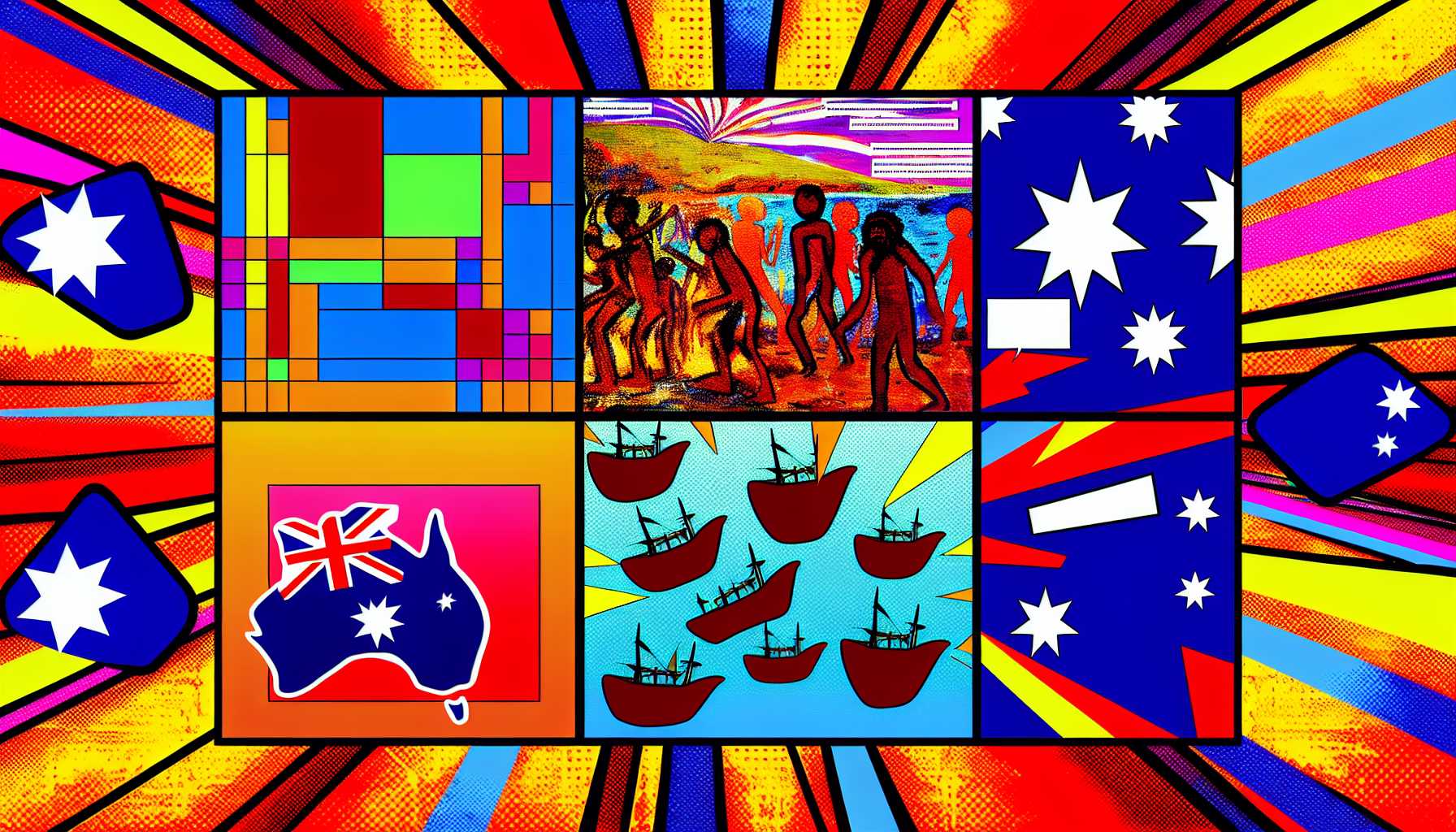Australian History Timeline: Key Events to Know for Citizenship
Written by Jogi for Australian Citizenship Tests
Read time: 5 min 57 sec
Explore the key events in Australian history that are essential for citizenship. This timeline has significant milestones and gives you insights for your test.

Introduction
Australia's history is a rich tapestry woven with diverse cultures, significant events, and remarkable achievements. For immigrants aspiring to become Australian citizens, understanding this history is not just a requirement for the citizenship test but also a way to connect with the nation's heritage. Did you know that Aboriginal Australians have been living on this continent for over 50,000 years? This fascinating journey through time will help you appreciate the milestones that have shaped modern Australia.
In this comprehensive timeline, we will explore key events from the ancient arrival of the first inhabitants to the contemporary developments that define Australia today. Whether you're preparing for the Australian Citizenship Test or simply interested in the country's past, this guide will provide valuable insights and context. Let's embark on this historical journey together.
Ancient History
Australia's ancient history is a testament to the resilience and ingenuity of its first inhabitants. The continent's story begins with the arrival of the ancestors of Aboriginal Australians around 50,000 to 65,000 years ago. These early settlers, arriving from Southeast Asia, established a rich cultural heritage that continues to thrive today.
Arrival of Aboriginal Australians
The ancestors of Aboriginal Australians began arriving on the continent during the last glacial period. They traveled by sea from Southeast Asia and settled across Australia, forming approximately 250 distinct language groups. These groups developed unique artistic, religious, and social traditions that have endured for millennia.
Torres Strait Islanders
Around 4,000 years ago, the Torres Strait Islanders settled in the Torres Strait Islands. Culturally and linguistically distinct from mainland Aboriginal peoples, they were skilled seafarers who relied on seasonal horticulture and the resources of their reefs and seas for their livelihood.
Significant Discoveries
In 1944, a remarkable discovery was made on Marchinbar Island in the Northern Territory. Nine coins were found, including Dutch duits dating from 1690 to the 1780s and coins from the Kilwa Sultanate. These artifacts provide a glimpse into the early interactions between Indigenous Australians and other cultures.
European Exploration
The arrival of European explorers marked a new chapter in Australia's history. These early voyages of discovery laid the groundwork for future colonization and significantly impacted the continent's indigenous populations.

First European Landfall
In 1606, Dutch navigator Willem Janszoon made the first recorded European landfall on Australian soil. Sailing the Duyfken, Janszoon explored the western coast of Cape York Peninsula. This event marked the beginning of European interest in the continent.
Subsequent Explorations
Following Janszoon's expedition, other European explorers, including Dirk Hartog and Abel Tasman, made significant contributions to the mapping and understanding of Australia's coastline. Hartog's landing in 1616 and Tasman's exploration of Tasmania in 1642 were pivotal moments in the continent's history.
Impact on Indigenous Populations
The arrival of Europeans had profound effects on Australia's indigenous populations. The introduction of new diseases, displacement from traditional lands, and cultural disruptions were significant challenges faced by Aboriginal Australians and Torres Strait Islanders during this period.
Colonial Era
The colonial era in Australia began with the arrival of the First Fleet in 1788. This period was characterized by the establishment of British colonies, significant social and economic changes, and the impact on indigenous communities.
The First Fleet
On January 26, 1788, the First Fleet, led by Captain Arthur Phillip, arrived at Port Jackson, marking the beginning of British colonization in Australia. This event is now celebrated as Australia Day. The fleet consisted of 11 ships carrying convicts, marines, and supplies to establish a penal colony.
Early Settlements
The early years of the colony were challenging, with settlers facing food shortages, harsh conditions, and conflicts with Indigenous Australians. Despite these difficulties, the colony gradually expanded, with new settlements established in Tasmania, Victoria, and other regions.
Impact on Indigenous Australians
The colonization of Australia had devastating effects on Indigenous Australians. The loss of land, exposure to new diseases, and violent conflicts led to significant population declines and cultural disruptions. Efforts to assimilate Indigenous peoples often resulted in the loss of traditional knowledge and practices.
Federation and Modern Era
The federation of Australia in 1901 marked the beginning of a new era in the nation's history. This period saw the unification of the colonies into a single nation, significant social and political developments, and Australia's emergence as a modern, multicultural society.
Federation of Australia
On January 1, 1901, the six British colonies in Australia united to form the Commonwealth of Australia. This event, known as Federation, established a federal system of government and marked the birth of the modern Australian nation.
World Wars and Economic Changes
Australia's involvement in World War I and World War II had profound impacts on the nation. The wars brought about significant social and economic changes, including the growth of industries, increased immigration, and the development of a distinct Australian identity.
Modern Developments
In recent decades, Australia has continued to evolve as a dynamic and diverse nation. Key developments include the recognition of Indigenous rights, advancements in technology and infrastructure, and Australia's role on the global stage. The country remains committed to fostering a multicultural society and addressing contemporary challenges.
Conclusion
Australia's history is a rich and complex tapestry that reflects the diverse experiences and contributions of its people. From the ancient traditions of Aboriginal Australians to the modern developments of a multicultural nation, each chapter of this history offers valuable insights for those aspiring to become Australian citizens.
Understanding these key events is not only essential for passing the Australian Citizenship Test but also for appreciating the unique heritage and values that define Australia. As you prepare for your journey to citizenship, take the time to explore and connect with the stories that have shaped this remarkable country. For more resources and support, visit Australian Citizenship Tests and embark on your path to becoming a proud Australian citizen.
FAQs
What are some key events in Australian history?
Key events in Australian history include the arrival of Aboriginal Australians around 50,000 to 65,000 years ago, the first recorded European landfall by Willem Janszoon in 1606, the establishment of the first British colony in 1788, and the federation of Australia in 1901.
Why is it important to know Australian history for citizenship?
Understanding Australian history is crucial for citizenship as it provides context for the nation's cultural, social, and political development. It helps immigrants appreciate the country's heritage and values, which are essential for integrating into Australian society and passing the citizenship test.
How did the First Fleet impact Australian history?
The arrival of the First Fleet in 1788 marked the beginning of European colonization in Australia. It led to significant changes in the country's demographics, culture, and governance, laying the foundation for modern Australia.
What role did Aboriginal Australians play in the country's history?
Aboriginal Australians have a rich history that spans over 50,000 years. They were the original inhabitants of the continent, with diverse cultures, languages, and traditions. Their contributions to Australian history are significant, including their resilience and ongoing efforts to preserve their heritage and rights.